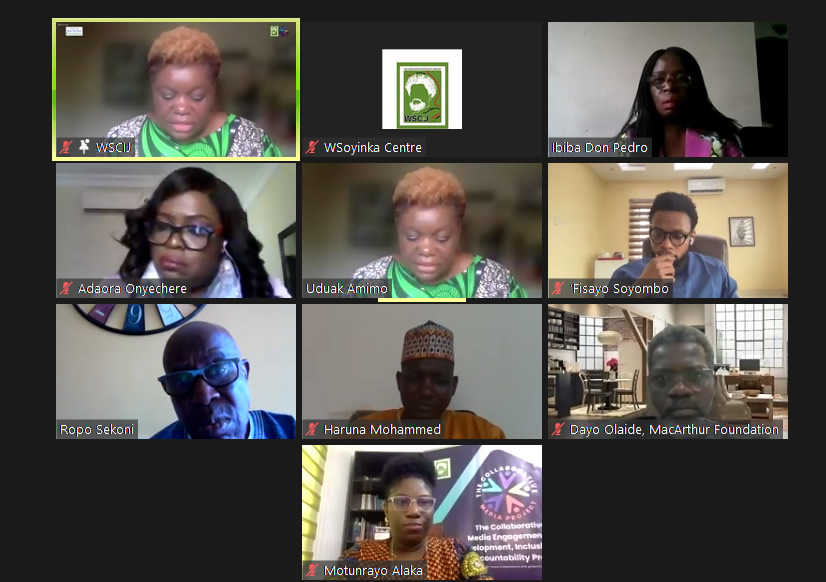The media have been urged to focus on reporting issues at sub-national levels of government for democracy to work in Nigeria.
Stakeholders made the call at the 14th Wole Soyinka Centre Media Lecture Series themed ‘Can democracy work without a strong sub-national media?’ held virtually on Wednesday 13 July 2022.
The lecture commemorated the 88th birthday of Wole Soyinka, the grand patron of the Wole Soyinka Centre for Investigative Journalism (WSCIJ) and Africa’s first Nobel Laureate in Literature.
Vice Dean for Education and Academic Affairs at Johns Hopkins School of Advanced International Studies, Chiedo Nwankwor, stated that accountability which is at the heart of journalism often drives transparency and government responsiveness.
The university don said the media must play its role to drive development and produce dividends of democracy at the sub-national levels, using the agenda setting and watchdog duties as tools.
In his contribution, the Director of the MacArthur Foundation Africa office, Kole Shettima, said the media’s watchdog duty seems vested at the national level amidst the human and institutional challenges bedevilling democracy in the last 20 years.
Shettima who was represented by Deputy Director, MacArthur Foundation Africa, Olaide Oladayo, said a huge chunk of the annual spending in Nigeria goes to the state and local governments hence failure to pay attention is partly responsible for the thriving underdevelopment at these levels.
Ibiba DonPedro, managing director of National Point; Haruna Mohammed, co-publisher, WikkiTimes; ‘Fisayo Soyombo, founder/editor-in-chief, Foundation for Investigative Journalism and Social Justice; Adaora Onyechere, executive director, Gender Strategy Advancement International; and Mansur Liman, director-general, Federal Radio Corporation of Nigeria) were panellists at the session moderated by Uduak Amimo, a broadcast and executive coach.
Shutting off people at the grassroots according to DonPedro means shutting out the voices and killing the aspiration for development by millions of Nigerians. She noted that media reportage should be active to keep up with the issues at the sub-national level.
Mohammed however affirmed that lack of information and knowledge gap is at the heart of many social issues facing people in the hinterland. For him, well-informed people are driven by knowledge and often make informed decisions.
Speaking on the challenge of citizens not knowing their rights and the duties of government at different levels, Soyombo noted that people are ignorant of what to do, who to blame or hold responsible when things go wrong despite all the media has done in projecting sub-national issues.
Onyechere called for community journalism as the way to expand the voices of marginalised groups, including women and persons with disability, at sub-national levels. She said that the media has a role to help the marginalised in society understand their rights as provided in the relevant policies, and also amplify the voices of the marginalised groups.
According to Mansur Liman, public media organisations often find themselves in difficult situations in most African countries due to the lack of understanding and overbearing attitude of government officials. He however encouraged journalists in the employ of government against self-censorship.
To launch the Collaborative Media Engagement for Development, Inclusion, and Accountability (CMEDIA) project, Motunrayo Alaka, executive director/CEO, WSCIJ, explained that the project which started in January 2022 beams the searchlight on public and private sectors at the state and local government levels. She added that the WSCIJ along with 26 media and media support organisations are paying attention to underreported issues such as minority groups, women, youth, persons with disabilities, and people in the hinterlands who do not get enough coverage in the news.


